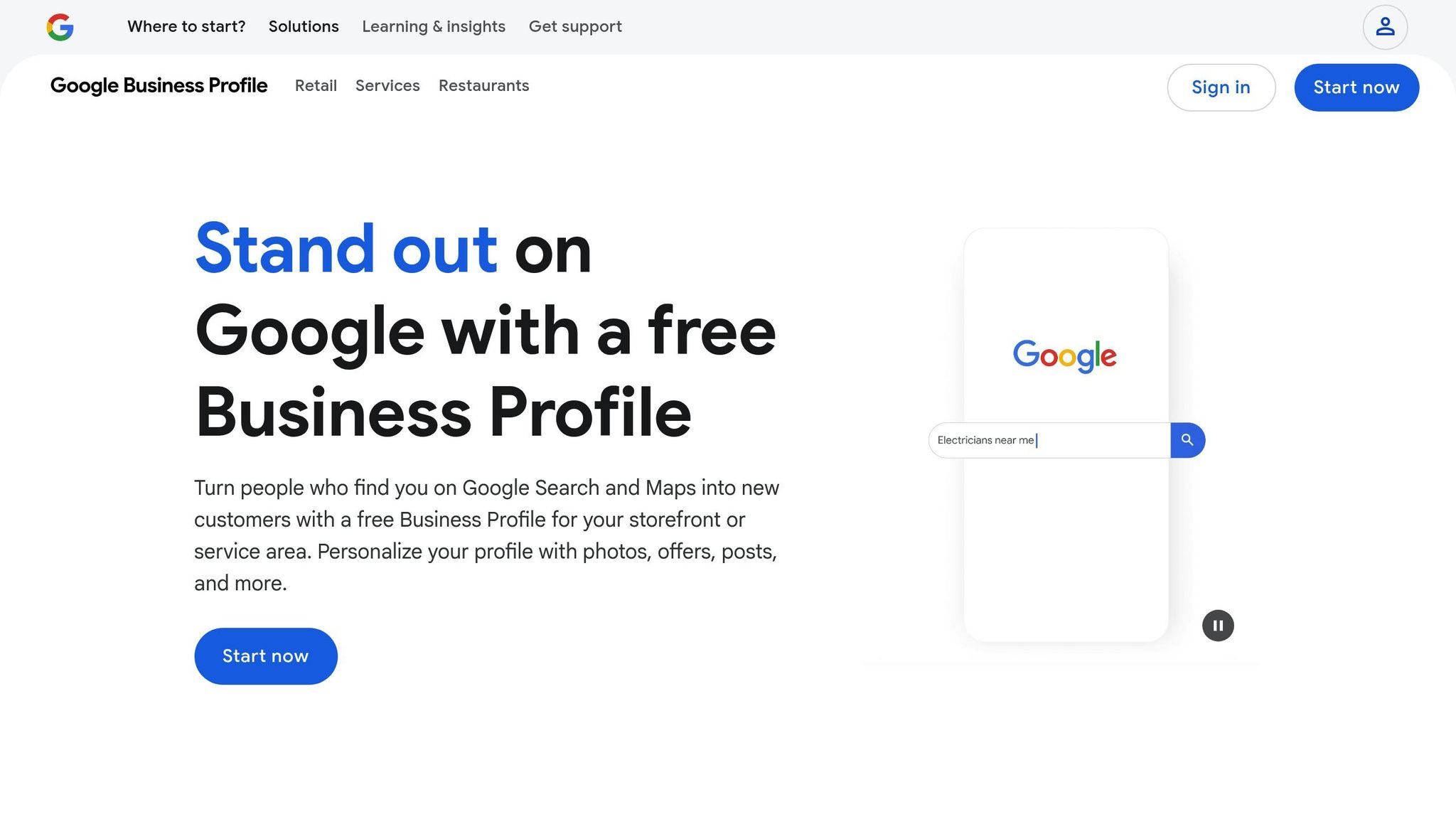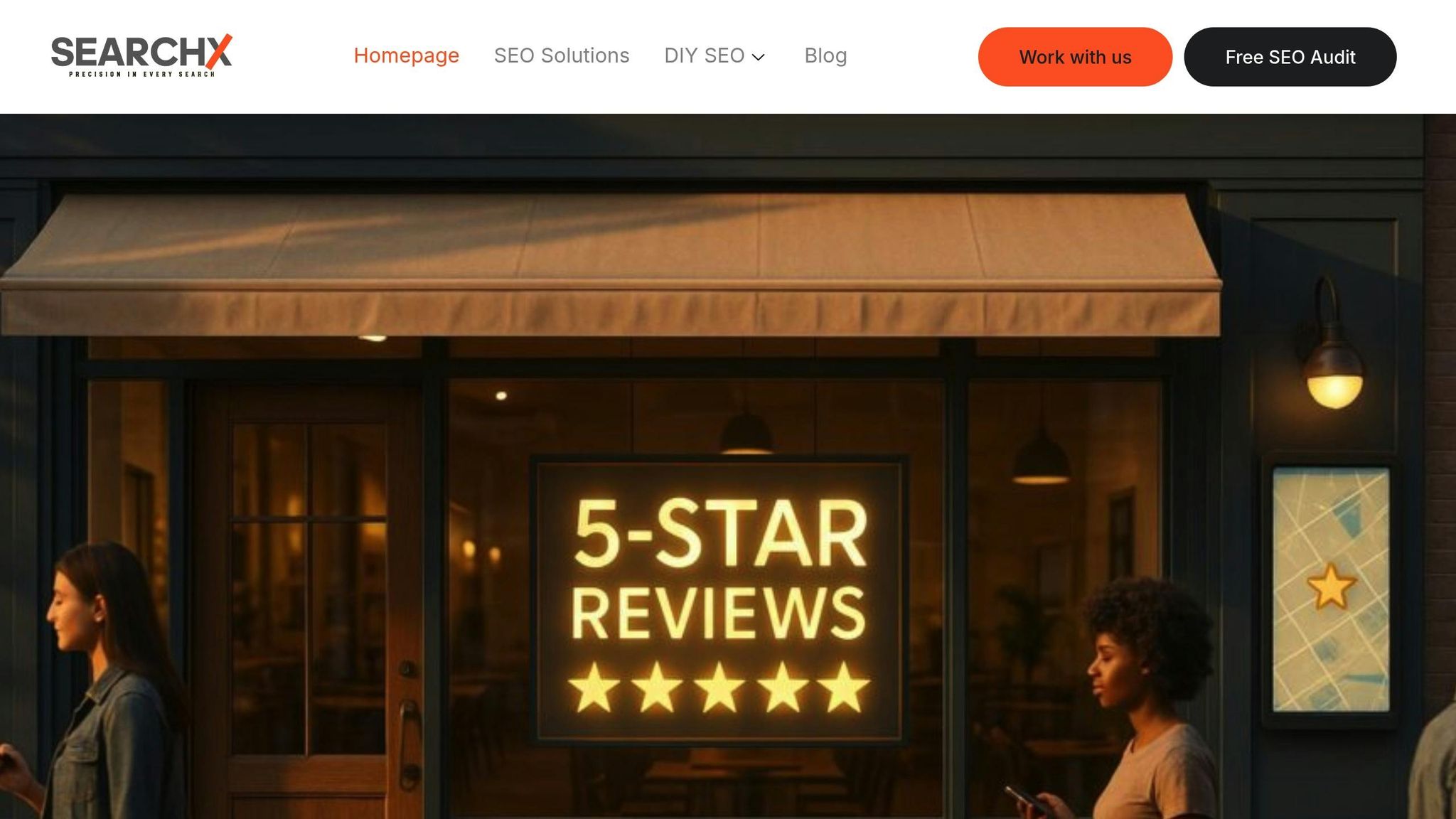Austin’s tech scene is booming, but standing out in this crowded market requires smarter local SEO strategies. Here’s why:
- Competition is fierce: With a mix of global companies and startups, businesses must improve visibility in search results to attract clients.
- Local search behavior matters: 46% of Google searches in Austin focus on local services, and 78% of mobile searches lead to offline purchases.
- Neighborhood-specific targeting is key: Each Austin area (e.g., The Domain, East Austin) has unique search trends and priorities.
- Advanced tactics drive results: Using hyperlocal keywords, Google Business Profile optimization, and schema markup can boost visibility and conversions.
To succeed in Austin, businesses must move beyond basic SEO and adopt strategies tailored to the city’s unique market dynamics.
How People Search Locally in Austin
Austin residents have distinct search habits shaped by the city’s unique mix of tech professionals, entrepreneurs, and longtime locals. With 46% of Google searches in Austin focused on local services and products, understanding how people search is essential for businesses aiming to connect with this audience.
Digital Skills and Hyperlocal Searches
Austin’s tech-savvy population expects fast, accurate search results. Nationwide, mobile searches now account for over 60% of all searches, with many of these being local. In Austin, this trend is even more pronounced. Notably, 78% of local mobile searches lead to offline purchases. For example, someone searching for "React developer near Domain" or "cybersecurity consultant South Austin" is likely ready to make a decision – not just browsing options.
"Mobile isn’t the future – it’s the now. In Austin, most local searches happen on smartphones, especially when users are commuting, out shopping, or attending events." – Raj Tyagi, Brightter
Voice search is also gaining traction. With 50% of all searches projected to be voice-based by 2024, Austin businesses are seeing more conversational queries like "Where can I find a UX designer who understands fintech?" instead of more rigid searches like "UX designer fintech Austin."
The demand for seamless user experiences is high. A one-second delay in mobile load times can reduce mobile conversions by up to 20%. Austin’s tech community, accustomed to polished professional tools, expects the same level of efficiency when interacting with local businesses. These trends underline the importance of creating hyperlocal, user-focused strategies.
Targeting Specific Austin Neighborhoods
Beyond digital habits, businesses must consider the unique needs of Austin’s diverse neighborhoods. Each area has its own identity, professional focus, and search behaviors. For instance, someone in East Austin looking for a marketing agency will have different priorities than someone searching in Westlake or The Domain. These differences go beyond geography – they reflect distinct business cultures and community values.
- The Domain: With its concentration of corporate offices and enterprise companies, searches here often center on B2B services, enterprise software, and corporate consulting.
- East Austin: Known for its creative startups and artistic vibe, this area sees searches for innovative agencies, freelance developers, and cutting-edge technology services.
- South Austin (SoAus): True to its independent, artistic spirit, this area emphasizes searches for businesses that feel authentic and locally connected.
- North Austin and Cedar Park: Home to established tech companies, these neighborhoods generate demand for scalable, enterprise-level solutions.
"In Austin, authenticity and community engagement are key. People in this city value businesses that are not only innovative but also socially responsible and community-oriented." – Eye See You Now
To capture these neighborhood-specific opportunities, businesses need to optimize for hyperlocal keywords. For instance, a tech professional in Mueller might search for "sustainable software development Mueller", while someone in Lakeway could be looking for "enterprise consulting Lake Travis area."
Austin’s tech community values relevance and precision. They’re drawn to businesses that understand their neighborhood’s culture, commute patterns, and professional networks. A generic approach like "Austin tech services" risks missing the personal connections that drive referrals and long-term relationships.
This focus on neighborhoods also influences mobile search behavior. Austin residents often search while on the move – whether commuting from downtown offices to South Austin meetups or hopping between coworking spaces in East Austin and corporate hubs in The Domain. Each shift in location represents a new intent and a fresh business opportunity.
Local SEO Tactics for Austin Tech Companies
Austin’s tech scene is vibrant and competitive, with countless businesses vying for local visibility. To stand out, tech companies in the city need a strategy tailored to Austin’s unique market dynamics.
Setting Up Your Google Business Profile

Your Google Business Profile acts as your digital storefront, especially in a city like Austin where local mobile searches often lead to offline actions. Optimizing this profile can make all the difference in attracting clients.
Start by completing every section with Austin-specific details. Use your exact address – whether you’re based in The Domain, East Austin, or another area – and specify service areas that cover regions like Cedar Park, South Austin, or beyond. Adding authentic photos of your team and workspace can help personalize your profile and build trust.
Keep your profile active by posting updates about your latest projects, team milestones, or participation in local events like SXSW or Austin Startup Week. These updates not only keep your profile fresh but also position your business as an active part of Austin’s tech community.
Reviews are another critical factor in Austin’s relationship-driven market. Respond to all reviews – positive or negative – professionally and promptly. Encourage happy clients to leave feedback that mentions specific services and locations, which can boost your profile’s relevance in local searches.
Using Austin-Specific Keywords
In Austin’s competitive tech environment, generic keywords won’t cut it. Hyperlocal keyword strategies can help you capture how locals search for tech services.
Neighborhood-focused keywords are especially effective. Instead of broad terms like "web development Austin", try more targeted phrases such as "React developer East Austin" or "enterprise software consultant The Domain." Many Austin professionals live in suburbs like Cedar Park but commute downtown, so search terms like "IT support Cedar Park to downtown Austin" can align with these patterns.
Austin’s unique culture also offers an opportunity to connect with the market. Incorporate terms like "Keep Austin Weird", "South by Southwest", or references to major local employers like Dell and IBM to establish credibility and resonate with the local audience.
Since Austin is a mobile-first city when it comes to search behavior, researching mobile-specific keywords is essential. Tools like Mobile keyword research can help you identify trends and queries to target.
To maximize the impact of these keywords, combine them with precise schema markup for better local visibility.
Adding Local Business Schema Markup
Schema markup is a powerful tool that helps search engines understand your business’s location and services, increasing your chances of appearing in local search results. For Austin tech companies, structured data can be a game-changer.
Start with LocalBusiness schema, which should include your full address, phone number, and service areas. Highlight specific districts like "East Austin" or "The Domain" to strengthen your connection with neighborhood searches.
For tech companies offering multiple services, Service schema is crucial. Mark up each service – whether it’s web development, cybersecurity consulting, or mobile app development – with location-specific details. This can help you rank for searches like "cybersecurity consultant near The Domain" or "mobile app developer South Austin."
Review schema is another must-have in Austin’s review-centric tech community. Properly marked-up reviews, especially from local clients, can display star ratings directly in search results, boosting your click-through rates.
If your business participates in local events, Event schema can be a great addition. Use it to promote your involvement in events like Austin Startup Week, SXSW panels, or meetups, helping your business appear in event-related searches.
Finally, Organization schema can reinforce your local presence by highlighting partnerships, team members with Austin ties, or other community connections. This helps search engines recognize your authority within the local market.
When implementing schema, accuracy is key. Use tools like Google’s Rich Results Test to ensure everything is set up correctly. Many businesses find the JSON-LD format to be the easiest way to add schema markup, as it’s Google-recommended and can be placed in your website’s header or footer for site-wide use – or on specific pages for tailored details.
Tools and Resources for Austin Local SEO
Austin’s tech scene is booming, and standing out in local search results requires the right tools and strategies. To thrive in this competitive market, businesses need resources tailored to Austin’s unique dynamics and designed to deliver measurable results.
SearchX Local SEO Tools

SearchX provides a suite of tools specifically crafted for local markets like Austin. Their keyword research service is a game-changer for tech companies, uncovering hyperlocal search opportunities that more generic tools often overlook.
One standout feature is the Free GMB Audit Tool, which evaluates your Google Business Profile. It highlights areas for improvement, such as profile completeness, review response rates, and local keyword optimization – key factors for visibility in neighborhoods like The Domain or East Austin.
Another helpful tool is the Free Website Audit Tool, which identifies technical and content issues that may hurt your local search rankings. From missing schema markup to other technical gaps, this tool ensures your site is optimized for Austin’s tech-savvy audience.
If you’re looking for a hands-on approach, SearchX’s DIY local SEO resources provide step-by-step guidance for implementing local strategies. For more established businesses, their managed services start at $3,000 per month with the Starter plan. This includes up to three SEO content pieces, local listing management across 50+ directories, and Google Business Profile optimization. The Growth plan, at $6,000 per month, adds in-depth competitor analysis, a must-have for staying ahead in Austin’s dynamic tech ecosystem. These tools and services seamlessly integrate with broader local SEO efforts, helping tech companies cement their presence in Austin.
Tracking Performance and ROI
Once your local SEO tools are up and running, tracking their impact becomes essential. In Austin’s competitive tech market, precise measurement of your efforts ensures you’re reaching the right audience. Standard analytics might not tell you if your coworking space in East Austin is seeing more foot traffic or if your consultancy near The Domain is attracting nearby commuters.
SERP feature tracking tools are invaluable for monitoring how your business appears in local pack results, knowledge panels, and other Austin-specific search features. This is especially important in a city where search results can vary significantly between neighborhoods like South Austin and North Austin. Tracking local keyword rankings in areas such as The Domain or East Austin provides direct feedback on the effectiveness of your hyperlocal strategies.
Key metrics to focus on include local keyword rankings for neighborhood-specific terms, click-through rates from Google Business Profile views, and conversion rates from local search traffic. Measuring SEO ROI from organic traffic growth can be tricky in local markets, but it’s vital for identifying which Austin-focused strategies are delivering the best returns.
Austin’s local traffic patterns also play a role. Many tech professionals commute from suburbs like Round Rock or Pflugerville to work in downtown Austin or The Domain. Your tracking efforts should account for these varied commute patterns and changing search behaviors across different areas and times.
SearchX’s 12 essential SEO metrics framework includes local-specific data points like “near me” search visibility, local citation consistency, and review velocity. These metrics are critical for standing out in Austin’s tech-driven market.
Monthly reports should focus on actionable insights rather than vanity metrics. For example, analyzing the impact of participating in local events like Austin Startup Week or targeting "SXSW" keywords in March can help fine-tune your strategy and justify continued investment in local SEO tailored to Austin’s unique tech environment.
sbb-itb-880d5b6
Conclusion: Succeeding in Austin’s Tech Market with Better Local SEO
Austin’s tech scene is buzzing with activity. As established companies grow their footprint and startups sprout up seemingly overnight, competition for local visibility is heating up. To stand out, businesses need to go beyond the basics and embrace smarter local SEO strategies tailored to Austin’s unique market.
The leap from basic to advanced local SEO can make all the difference. Instead of sticking to generic keywords, focus on hyperlocal searches like "AI consulting near The Domain." Keep your Google Business Profile up-to-date, actively manage reviews, and post targeted updates to stay relevant.
Austin’s tech-savvy audience expects fast, mobile-friendly websites and precise schema markup to help them quickly compare options. Meeting these expectations can set your business apart in a crowded field.
To take it further, tools like SearchX’s local SEO solutions can help pinpoint untapped keyword opportunities and measure the effectiveness of neighborhood-focused strategies. Their managed services, starting at $3,000 per month, provide a comprehensive approach tailored to Austin’s competitive tech market.
Winning in Austin also means understanding local habits – targeting suburban commuters, aligning with major events, and tapping into the city’s distinct search trends. By adopting these advanced strategies, businesses can not only attract more qualified leads but also strengthen their community presence and outpace competitors still relying on outdated tactics. In Austin’s ever-evolving tech landscape, staying ahead means building a solid local SEO foundation.
FAQs
How can businesses in Austin use hyperlocal keywords to enhance their local SEO strategy?
To improve local SEO, businesses in Austin should prioritize hyperlocal keywords that highlight specific neighborhoods or well-known landmarks, like "South Congress", "The Domain", or "East Austin." Incorporating these terms into your website content, Google Business Profile, and localized landing pages increases your chances of showing up in neighborhood-specific searches and on Google Maps.
For an extra edge, pair hyperlocal keywords with community-oriented phrases, such as "top restaurants in South Congress" or "best coffee shop near The Domain." This approach not only attracts a more focused audience but also boosts your visibility among local customers actively looking for nearby services.
How can Austin tech companies optimize their Google Business Profile to improve local search visibility?
Austin’s tech companies can give their Google Business Profile a boost by making sure all details – like the business name, address, phone number, and operating hours – are accurate and consistently updated. This simple step helps establish trust with both potential customers and search engines, which can lead to better local search rankings.
To make an impression in Austin’s bustling tech landscape, keep your profile lively by adding new photos, posts, and timely responses to customer reviews. Use location-specific keywords in your business description and select categories that closely match your services. These efforts not only improve your visibility but also help grab the attention of Austin’s tech-savvy crowd.
Why is it important for tech companies in Austin to understand local search habits in different neighborhoods?
Local SEO Strategies for Tech Companies in Austin
For tech companies in Austin, tapping into the unique search habits of each neighborhood is crucial for building effective local SEO strategies. Austin’s residents are tech-savvy, often searching on mobile devices for hyper-local solutions to their needs – whether it’s finding a nearby service, product, or business. What makes this even more interesting is how each neighborhood in Austin carries its own character, shaping the way locals search online.
By focusing on these neighborhood-specific behaviors, businesses can fine-tune their SEO efforts. This means weaving in keywords tied to specific neighborhoods and ensuring local business listings are fully optimized. The result? Better visibility in search results, stronger connections with the local audience, and a chance to build trust within the community. In a city as competitive and forward-thinking as Austin, this kind of targeted approach can make all the difference for tech companies looking to stand out.




